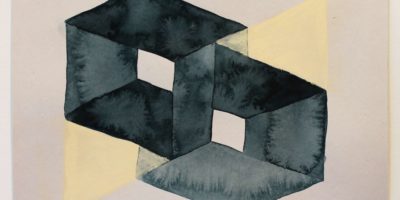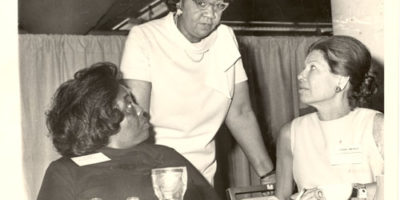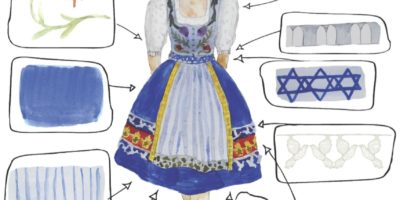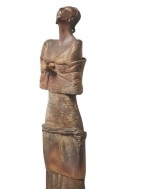
Mrs. Akiva Speaks
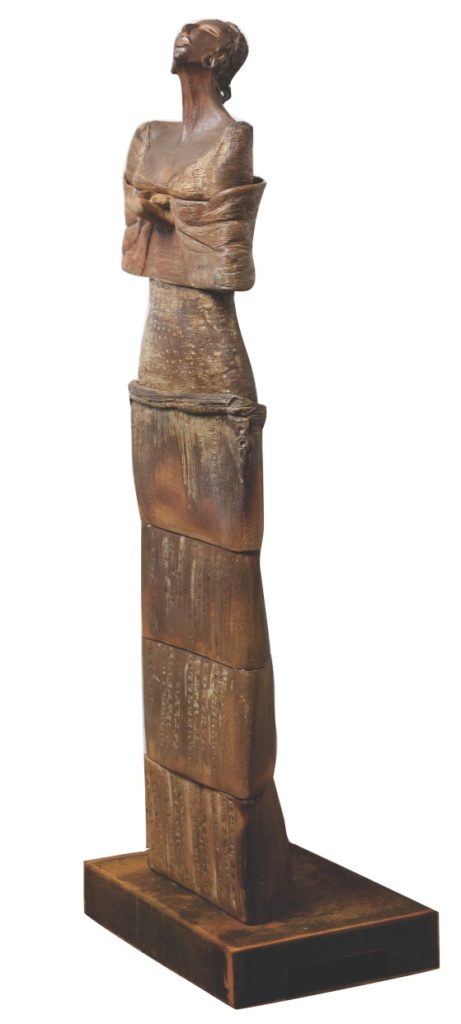
tania kravath, wood fired ceramic fountain, 2013, 64″ x 24″ x 24″
For many months this past year, the Israeli bestseller list was dominated by two novels: Fifty Shades of Grey by E.L. James, and Akiva’s Orchard by Yochi Brandes. The former is an international publishing sensation, an erotic novel about an innocent literature student who finds herself in the thrall of an enigmatic young entrepreneur who wants her, too — but on his own terms. The latter is a biography of Rabbi Akiva as narrated by his wife Rachel, who introduces herself as an aguna, a “chained” woman — bound to her husband in marriage, but abandoned by him so that he might study Torah.
The bare bones of the Rabbi Akiva story (and when it is taught to schoolchildren it is always his story) tell of Akiva’s start as an ignorant shepherd. Rachel recognizes something special in him, and offers to marry him and support him so that he can study. This outrages her wealthy father, who disowns her. Akiva goes off to learn Torah for 24 years, returning as a revered scholar to find his wife impoverished, wizenend, in tatters. The adoring students who accompany Akiva try to shoo away the old beggar woman, but Akiva explains that he (and hence, by extension, they) would be nothing without her faith in him and her sacrifices.
Here, an excerpt from Akiva’s Orchard.
I am shut in this cave for three years now, I stayed alive to write this book, in another four weeks, I will entrust it into Miriam’s hands, I have still not called her to come, when she knelt to birth her child, I averted my eyes, I could not bear to see the baby.
A woman without a father or a husband — what does she have in life? Who will support her? Who will take care of her? Who will protect her?
At first I would wait for him, waking on Fridays before dawn so that I would have enough time to shop in the market in Tiberias and to cook his favorite foods. I can’t start shopping any earlier, I need to spend five days a week working as a laundress from dawn to dusk, otherwise I will not be able to support Chana.
That first week we went out to greet him in our clean Shabbat dresses. The sun was setting. Shabbat was soon upon us. Chana burst into tears. I put her to sleep without dinner and collapsed next to her on the bed.
In subsequent weeks I would no longer go out to greet him, but I continued to prepare Shabbat dinner in the hope that at any moment, he would open the door and I’d see him enter. He took no vow, unlike my father. His oath rolled off his tongue unawares; he will yet return to me.
The two men in my life left me for opposite reasons — my father banished me because I didn’t want to fulfill his dream, and my husband won’t return to me because I wanted to fulfill his dream too much. These bitter feuds came together in a cruel trick of fate, resulting in a double betrayal — my father betrayed me because of my devotion to my husband, and my husband betrayed me because of my devotion to my father.
These two men in my life abandoned me, but I have a daughter who gives me joy, a pregnancy that instills in me hope, and sisters in sorrow who offer me comfort. The matriarch Rachel and Michal the daughter of King Saul, my ancestral sisters — I draw strength from your stories. You too were torn between father and husband, you too were betrayed by both. Your father, Rachel, saw you as a tool to achieve his own goals, and your lover, Michal, abandoned you after you saved his life. How similar we are, the stories of our lives cast in the same mold. But your lot is superior to mine, your husband did not leave you, Rachel, and your father did not disown you, Michal. You each were left with one man, enraged and aggrieved, but nonetheless present. Whereas I was abandoned by both my father and my husband, the two men who ought to have been my defenders.
The exhausting work of laundering wears at the skin of my hands and breaks my back, but hope keeps my spirits high. After I give birth, my husband will return to me, certainly if I have a son. After all, a father is obligated to circumcise his son. A crier will convey the message to Lod, and my good neighbors will direct him to me. Lately they are on my side again, now that my husband’s coals no longer blacken the walls of their homes.
The contractions wrack my body a month early, my womb opens before it is time, my baby is weak and tiny, I can barely hear his faint cries as he struggles to suckle. My neighbors comfort me, saying that this little boy will be a great man someday, a man among men, like his father who is lean in frame and small in stature but who has the strength to split wood and carry coal. I lie on the pottery wheel and whisper quietly to him, so that the neighbors won’t hear, “Your strength will be for Torah, my son. When you turn three I will teach you Torah, and when you are five I will send you to school, and when your beard begins to sprout you will enter the yeshiva. You won’t have to wait until you are forty.”
Although he is still weak, I sharpen the knife. “At the age of eight days you shall circumcise every male.” A father is obligated to circumcise his son. Chana cries; ever since her mother sold her hair and her father abandoned her, she weeps at the slightest provocation. Don’t cry, my child, in another week your father will come home.
On the morning of the eighth day, the crier returns from Lod. Alone. The neighbors gather around him, their voices angry and agitated. I head outside, the baby in my arms, my daughter clutching the hem of my skirt. The crier lowers his eyes. I enter the yeshiva, I call out his name, they direct me to a bald man sitting on the last row of benches, I share the news of the birth of his son. Your wife expects you, I say. He responds: She is not waiting for Akiva, but for Rabbi Akiva. I do not understand him.
The neighbors take the baby from my arms and rest him on the stone. It is time for the circumcision, it’s forbidden to delay it. If a boy’s father has left, another man circumcises him instead. I dart forwards and spread his tiny legs, holding the knife confidently in my steady hands. “And Tzippora took a sharp stone and cut her son’s foreskin.” My husband is like Moses and I am like Tzippora. He is off fulfilling his destiny, and I stayed home to circumcise you, my son. You hereby enter into the covenant of our forefather Abraham, father of the Jewish people. He too left his land and his birthplace and his father’s house; the realization of his illustrious destiny required this act of desertion. All our great leaders were exiled from their homes in order to realize their destinies: Abraham and Jacob, Moses and David, Elijah and Jeremiah, Hillel and Rabbi Yohanan, and your father too. I sent him to learn Torah, which was my dream and my aspiration. I will call you Shimon, from the Hebrew word for “hear,” because God has heard my prayer.
The neighbors exchange horrified glances, my baby’s cries blend with their muffled whispers. I bandage his wound and press his mouth to my breast, and he rests in my arms calmly and quietly. Behind me, like a swarm of bees, I can hear the buzz of their words: Abandoned. Deserted. Alone.
I am a chained woman, bound to my husband by marriage but utterly forsaken by him. The years of my abandonment are innumerable and unbearable, but I can summarize them in just a few words:
My name is Rachel, but everyone calls me the abandoned one. I have two children: a healthy, strong daughter and a weak and sickly son, and in order to support them, I wash clothes in the river from sunrise to sunset. My hair is growing back, but instead of my shiny silken tresses my head is now covered with lusterless strands of flax.
The years of my abandonment are innumerable and unbearable. Nothing ever happens to me, whereas his days are full of consequence. I will hear about them someday, mainly from the one they still call Rabbi Elisha, and I will hear about them from Ima Shalom. The rest I will figure out myself. I see the visions and I hear the voices as if it all unfolds before my eyes.
The years of my abandonment are innumerable and unbearable. Day after day, week after week, year after year. Each day resembles the previous one. What news can there be in the life of an abandoned woman?
But the story is not over.
This is not the story of Rachel; this is the story of Akiva.
I am alive for the sake of this story.
I have lived to tell this tale.
Yochi Brandes is the author of seven novels and a collection of essays on Biblical women, all bestsellers in Israel. She teaches and lectures widely on the Bible
and literature.
Ilana Kurshan works as a translator and editor for a Jerusalem-based literary agency.

